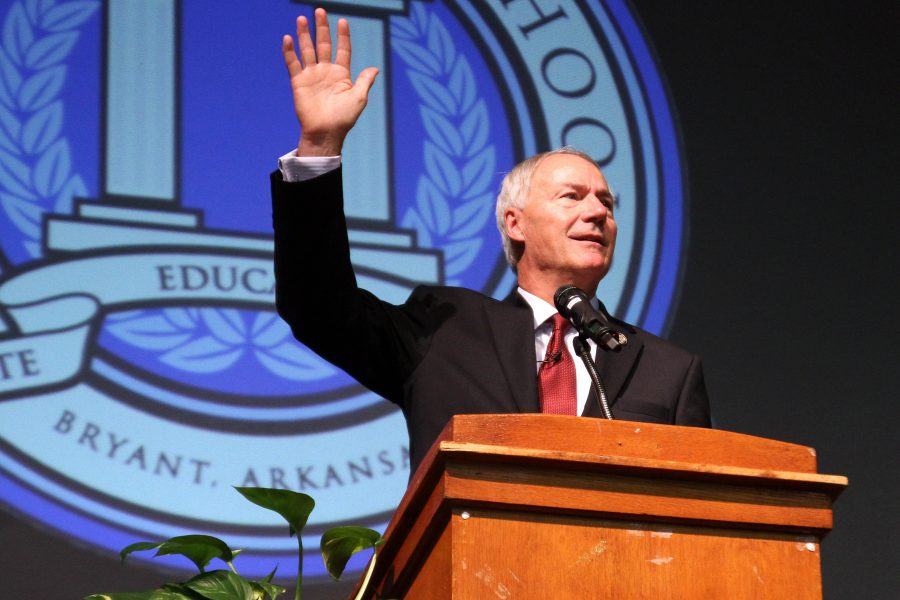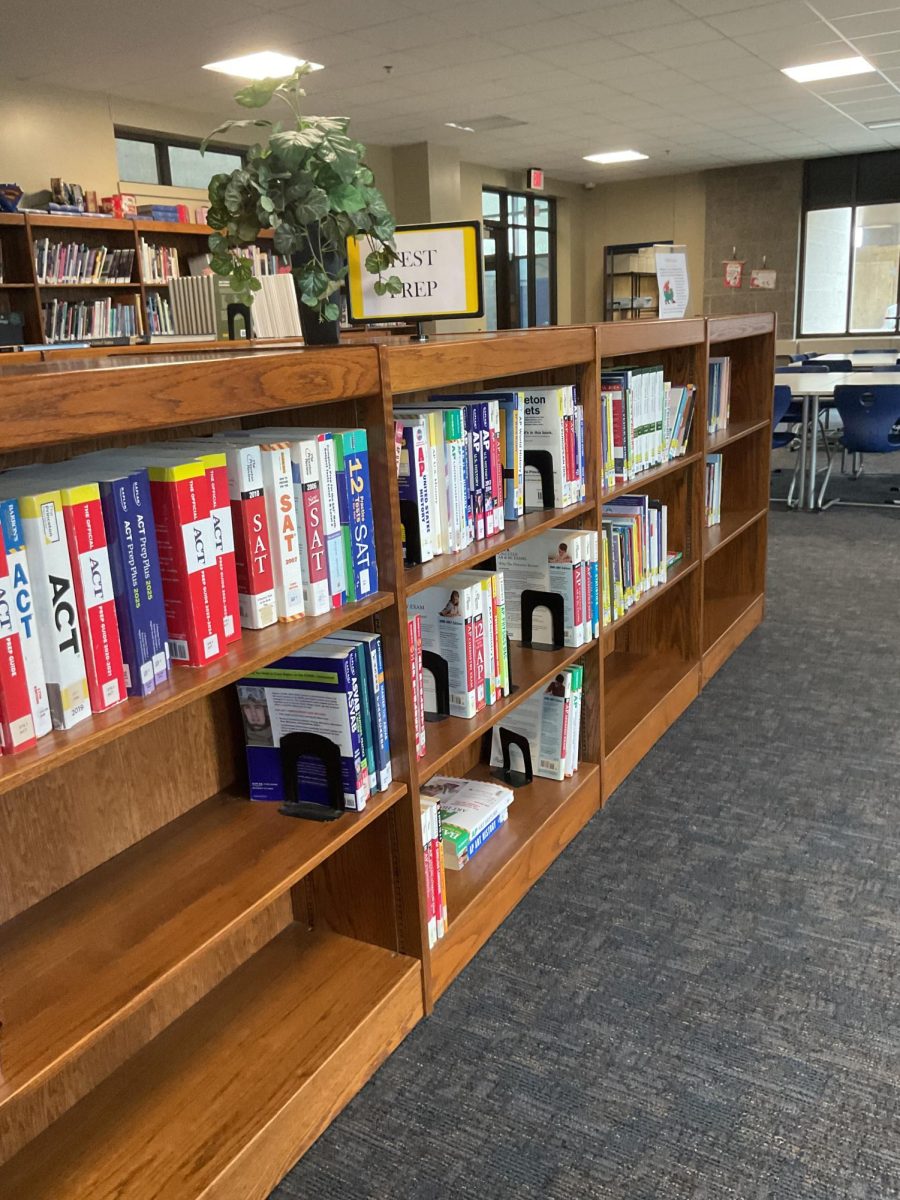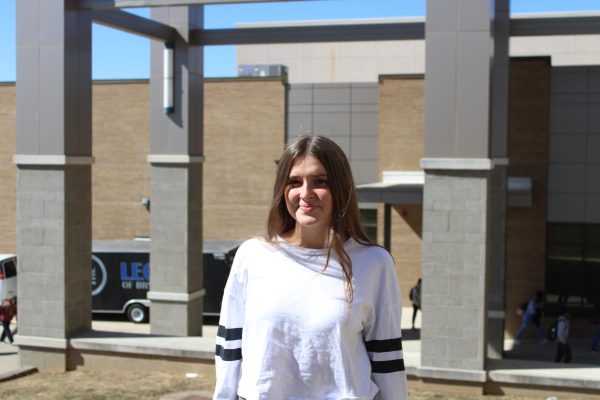Speaking in Code: Governor Asa Hutchinson Promotes STEM Education to Juniors
Governor Asa Hutchinson introduces himself to the junior class Monday, August 22 in Love Auditorium. “Thank you for your hospitality and for allowing me to come talk about what you will consider a very boring subject, and that is computer coding,” Hutchinson said in his opening statements. This was the second stop (after Benton High School) of his statewide coding tour. | photo Hannah Martin
August 23, 2016
As his second stop in a state-wide tour promoting computer programming education, Governor Asa Hutchinson addressed the junior class Monday in Love Auditorium.
In 2015, Arkansas became the first state to require all public and charter high schools to provide courses in computer science, an effort largely spearheaded by Hutchinson. The initiative is primarily rooted in economic goals; according to Hutchinson, there are expected to be approximately one million unfilled jobs nationwide in the computer science sector in the next two years.
Preliminary filings for Arkansas by the Bureau of Labor Statistics for July report that 52,709 civilians of the 1,357,310-civilian labor force are unemployed, meaning that filling 0.0527 percent of Hutchinson’s predicted available jobs with Arkansas’s jobless would eradicate the current unemployment rate.
This would combat “brain drain,” a socioeconomic phenomenon in which educated individuals move from an area after acquiring an education, leaving that region with less-skilled workers and less higher-paying jobs. While Arkansas actually gained more students than lost students in 2012, close proximity to hubs such as Dallas often draw business owners, growing corporations and students from the state.
“The goal [of the initiative] is to create the talent that we need in Arkansas to have technology companies as a significant part of our economy,” Hutchinson said.
Aside from economic benefits, Hutchinson focused on diversity.
“[Technology] will affect the state in terms of shaping the future,” Hutchinson said. “You want the future to be shaped by everyone, with different backgrounds and different cultures. That’s why we need women engaged in it, we need minorities, we need everybody from different backgrounds engaged.”
Science, technology, engineering and math (STEM) scholarships frequently target minorities in an attempt to diversify a field historically dominated by white and Asian men.
Hutchinson also visited computer science teacher Brenda Qualls’s ALICE Computer Programming class, talking about the specifics of coding with Qualls and her students. Students ran programs they built while the Governor asked them about how they used ALICE. While this has become a large project of his administration, Hutchinson himself is largely inexperienced when it comes to writing code and recently attended the Hour of Code to learn JavaScript basics.
This is not Hutchinson’s first time focusing on state education as Governor. In 2015, the Little Rock School District was taken over by the state Board of Education because the district was deemed “failing.” Hutchinson has appointed five of the nine current board members, and under their administration, Little Rock has seen charter school growth, an expansion which has resulted in heated debate. Vice chair of the state Senate Education Committee Joyce Elliott has sharply criticized charter schools in the past, voicing concerns that they foster communal inequality. Supporters of charter schools claim that the schools provide opportunities that public schools fail to provide.
When asked if the new outreaches for the coding initiative might include establishing more charter schools to focus on STEM, Hutchinson said they could.
In the last minutes of his speech to the junior class, Hutchinson shifted to discussions of technology in national security, a topic the current presidential candidates have widely discussed. Hutchinson dealt first-hand with national security during his time in Congress.
“One month after I [started at the Drug Enforcement Agency], the 9/11 attack occurred, which changes everything,” Hutchinson said. “The President called me into the situation room in the White House, where we were briefed by the CIA on the latest terrorist threats. After he heard this, the President turned to me and said ‘Asa, what are we doing about that?’ I was a lawyer, I grew up on a farm, I was in Congress–nothing prepared me for that challenge. I realized very quickly that you had to have a good strategy. We became an information consumer in the area of security. It took people to analyze that information, that’s where code writers came in.”
Hutchinson served as the first Undersecretary of the Department of Homeland Security. The intelligence collection he referred to was largely made possible by the USA Patriot Act, which allows for data collection by the government from individuals without a warrant. Parts of the Patriot Act have since expired, however, government-collected intelligence has remained a relevant topic in American politics.
“Even this last year, the Democratic National Committee [had] some of their emails stolen, which is just an embarrassment to our country and political process,” Hutchinson said. “It’s critically important for our national security to address the cybersecurity threat.”
Hutchinson continually stressed that software was relevant in all fields, not just STEM and national defense.
“I don’t try to be narrow when I talk about computer science,” Hutchinson said.
As for encouragement for budding coders and software developers?
“You could be the next Bill Gates who leads our country in a computer revolution,” Hutchinson said.




